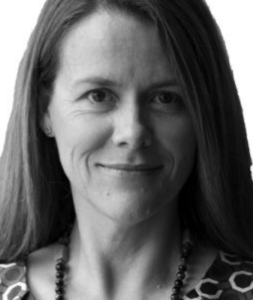Over the past few years, it’s been encouraging to see purpose-led business accelerate – not in spite of the pandemic, but because of it, as the link between social and business prosperity becomes increasingly clear. But what next?
We asked a few leaders from the shared value network what they hope or predict for the year ahead.
Hope: Technological innovation will become more human-centred
Helen Maisano, director of group sustainability at Optus
 “Digital technologies have radically changed our way of life, making access to education, employment, healthcare, transport, communication, travel, fitness, working from home and even our shopping easier and simpler. These new technologies have only grown and become vital during the pandemic, as we’ve tried to maintain some kind of continuity in life and in business, and remain connected with family and friends.
“Digital technologies have radically changed our way of life, making access to education, employment, healthcare, transport, communication, travel, fitness, working from home and even our shopping easier and simpler. These new technologies have only grown and become vital during the pandemic, as we’ve tried to maintain some kind of continuity in life and in business, and remain connected with family and friends.
“While there are enormous benefits to the digital world, we need to be aware of some of the challenges, such as when there is no balance between the virtual and physical world and mental health is affected, when negative online behaviour jeopardises individuals’ safety and wellbeing, or when disadvantaged Australians simply miss out on accessing essential services because they can’t afford digital access.
“More than ever before, technological innovation needs to be human-centred, with consideration to how it affects issues such as mental wellbeing and inequality. My hope is that, as leaders, we can all play a key role in ensuring the wellbeing and advancement of humanity is central to how we design technology in the future.”
Prediction: Net zero commitments will impact the war for talent
Rosalie Wilkie, social impact partner at PwC Australia
 “We know that the fortune of an organisation depends in no small part on its talented individuals. That’s why now, more than ever – as migration continues to stall, and employees seek empowerment to make a positive impact in the world – it’s critical that businesses are having a good look at how they’ll win the war for talent.
“We know that the fortune of an organisation depends in no small part on its talented individuals. That’s why now, more than ever – as migration continues to stall, and employees seek empowerment to make a positive impact in the world – it’s critical that businesses are having a good look at how they’ll win the war for talent.
“Meanwhile, we are seeing net zero commitments change industries, management incentives, the availability of capital and stakeholder expectations. Both of these areas are highly interconnected – to attract talent, organisations will need to demonstrate real action on climate change; and likewise, organisations will need new skill-sets combined with bold, innovative thinking to reach their net zero targets. Organisations with a poor ESG record or those who fail to link their ESG strategy to their core business strategy, using tools like shared value, will continue to be left behind by those wanting to work for an organisation where they feel they can make a difference.”
Prediction: Trust and transparency will continue to drive competitiveness
Michelle Hutton, vice chair of Edelman Asia Pacific and CEO of Edelman Australia
 “In 2022, transparency and social action will be the currency with which business will earn the trust of their people and the public. Last year in Australia, we saw soaring levels of trust, with institutions riding high on the prospect that the nation had beaten back the pandemic. We know now those hopes were premature, and following a year of persistent delay and disruption, perhaps it’s unsurprising that we’re seeing public trust begin to falter. Expectations are high, and people are looking to their leaders – and here lies the opportunity for business.
“In 2022, transparency and social action will be the currency with which business will earn the trust of their people and the public. Last year in Australia, we saw soaring levels of trust, with institutions riding high on the prospect that the nation had beaten back the pandemic. We know now those hopes were premature, and following a year of persistent delay and disruption, perhaps it’s unsurprising that we’re seeing public trust begin to falter. Expectations are high, and people are looking to their leaders – and here lies the opportunity for business.
“2022 must be the year of action; business has a larger-than-ever mandate to use its resources and scale to create value beyond the balance sheet. We’ve seen many companies declare bold ambitions in recent years, and society is now watching closely to see who will deliver. As firms work to create value for society, they have an opportunity to build trust with stakeholders along the way through operational transparency and authentic communication.”
Hope: Communities will have a voice in forming climate solutions
Kaitlin Shilling, international development associate principal and resilience skills leader at Arup
 “Climate change is affecting every community in Australia. And how they are able to respond, transform and thrive as the environment changes depends on how resilient they are. In our preparations, it’s important to include the community in conversations and build community resilience – preparing as individuals, neighbourhoods, associations, and organisations, so that they become an integral part of planning and the solution.
“Climate change is affecting every community in Australia. And how they are able to respond, transform and thrive as the environment changes depends on how resilient they are. In our preparations, it’s important to include the community in conversations and build community resilience – preparing as individuals, neighbourhoods, associations, and organisations, so that they become an integral part of planning and the solution.
“This includes integrating diverse voices of community so that existing infrastructure and systems are built upon and can be strengthened. Finding the nexus of where these interests, needs and capabilities lie is where we will be able to identify and create plans and solutions that will enable our cities to be more resilient to global warming, extreme weather events and natural disasters.”
Prediction: Workplace mental health will be a business imperative
Margo Lydon, CEO of SuperFriend
 “Our world of work (and the way we interact with work) has changed forever! As a ‘silver lining’ to the pandemic, I expect the focus on workplace mental health and wellbeing will continue to be a priority in 2022 for every Australian business and worker. The great thing about this is that it genuinely creates shared value – that benefits the business, your workers, and the broader community.
“Our world of work (and the way we interact with work) has changed forever! As a ‘silver lining’ to the pandemic, I expect the focus on workplace mental health and wellbeing will continue to be a priority in 2022 for every Australian business and worker. The great thing about this is that it genuinely creates shared value – that benefits the business, your workers, and the broader community.
“Engaging with your workforce and exploring ‘how to make your workplace more mentally healthy’, can generate new business benefits, including increasing productivity and wellbeing. The opportunity to create economic value and social value through workplace mental health is, in my view, a business imperative.”
Hope: Business will embrace intersectionality
Yasmin Poole, one of Vogue’s 21 Australian women who defined 2021, and Martin Luther King Jr Center’s 2021 Youth Influencer of the Year
“As an Asian-Australian woman, I often see businesses discuss gender inequality without considering the experiences of culturally diverse women who can also experience racism.
Intersectionality recognises that we come from a diversity of backgrounds; such as gender, race, and sexuality, which changes how we experience discrimination. It’s time for businesses to champion intersectionality, from their hiring process, to their business strategy, to better uplift the communities who are too often left on the sidelines.”
Prediction: Purpose-led investment will continue to accelerate
Helen Steel, head of responsible investment and shared value at Mutual Trust
 “We are currently witnessing an explosion of interest in responsible investment and particularly ESG investing. The onset of the global pandemic and a general rise in awareness of factors such as climate change and its related effects have brought sharply into focus the fact that business and society are intrinsically linked. It is this realisation, I believe, that is also bringing about a re-evaluation of investment and a shift towards more purposeful or shared value investment, which I predict will continue to increase in the coming years.
“We are currently witnessing an explosion of interest in responsible investment and particularly ESG investing. The onset of the global pandemic and a general rise in awareness of factors such as climate change and its related effects have brought sharply into focus the fact that business and society are intrinsically linked. It is this realisation, I believe, that is also bringing about a re-evaluation of investment and a shift towards more purposeful or shared value investment, which I predict will continue to increase in the coming years.
“There is still a great deal of ‘greenwashing’ or ‘impact-washing’ however, and better due diligence is required in assessing these opportunities to identify those that can not only address the issues we are dealing with globally but deliver a strong commercial return. I can see a time in the next three to five years, when this will become investment-as-usual, and there will no longer be investment without considering the broader risks and societal implications. In the words of Harvard professors Michael Porter, Mark Kramer and George Serafeim: ‘Shared value investing… will help restore the inherent power of capitalism to make things better while creating powerful incentives for companies to innovate’.”
Hope: We’ll move mountains – together
Sarah Downie, CEO of Shared Value Project
 “The African proverb: ‘If you want to go fast, go it alone. If you want to go far, go together’ has always resonated with me. But, as we look to translate our ambition for societal change into action – especially when it comes to our climate – somehow, we will need to go far, fast. I am a firm believer that this will require collaboration like we have never seen it before, from all sectors – playing to their strengths, pulling in the same direction, to create meaningful change at scale.
“The African proverb: ‘If you want to go fast, go it alone. If you want to go far, go together’ has always resonated with me. But, as we look to translate our ambition for societal change into action – especially when it comes to our climate – somehow, we will need to go far, fast. I am a firm believer that this will require collaboration like we have never seen it before, from all sectors – playing to their strengths, pulling in the same direction, to create meaningful change at scale.
“Despite the enormous challenges, I am more hopeful than ever. It feels like the desire to work together exists, but perhaps the how is still a little scary. And so I hope that we let our guards down, allow ourselves to not ‘know’ the answers and not ‘own’ the outcomes, but to partner in every sense of the word so that we can move mountains, fast. And if we do, I think we will see a groundswell of new (and perhaps unexpected )partnerships that just might change the world.”
